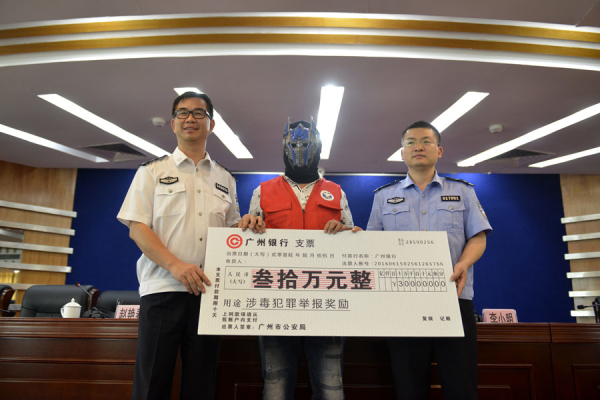Balancing the police's need to check IDs with people's rights
Updated: 2016-06-17 07:30
(China Daily)
|
|||||||||
 |
|
A courier masked as a "transformer" receives 300,000 yuan ($45,540) in cash reward for reporting a drug-related crime to the police in Guangzhou, South China's Guangdong province, June 15, 2016. [Photo/VCG] |
When the Ministry of Public Security, with the help of the "mainstream" media, tried to put an end to the public discourse about how innocent citizens should respond to police requests for personal identification information, they were not being unreasonable. Or wrong.
Not at all: for as they said, "It is a legal obligation for citizens to cooperate with the police to verify a resident's identification card in accordance with law."
Frustrated as they may be about reports of police officers abusing their powers, people generally agree that, under certain circumstances, ID verification is essential for guaranteeing public security, say for preempting acts of terror.
Each year, according to the ministry, police ferret out many criminal suspects through ID checks. From January to May alone, railway police departments caught 11,000 suspected criminals through verification of passengers' IDs, including people suspected of murder, robbery, fraud, and human trafficking.
Which is why, few will actually refuse a request by the police to check their IDs, when the reason for a check is given. Particularly if the officers involved sound reasonable.
Still, not a few have found the call for any citizen's unconditional compliance with law-enforcement activities, even when it is non-standard, unpersuasive, and indeed unpleasant, because it sounds incomplete, one-sided, even biased.
Since this whole debate originated from a case of an overbearing police officer in South China's Shenzhen abusing his authority in disregard of due procedure, wouldn't it be better for the statement to incorporate a mention of police discipline?
We know there has been a vow to regulate law enforcement, and that is to be applauded.
But it would have done no harm to reiterate it here. Especially, since this is a formal response to a matter of nationwide concern.
Otherwise it sounds problematic in terms of logic: How can a case of police misconduct end up with a high-profile reiteration of civilian compliance, with no mention even of due procedure?
True, few have openly challenged the disequilibrium between the habitual emphasis on citizens' duties and the neglect of their rights. But that doesn't mean people don't care. They do, and they keep asking questions; questions about appropriateness and about legitimacy.
In this particular case, people care more about whether there will be serious follow-up moves to rein in abusive officers, and ensure that when a police officer asks a citizen to produce their ID card, they do so in accordance with the law.
Related Stories
Two police officers killed in attack claimed by Islamic State group 2016-06-15 07:48
Police need tighter rules to govern behavior, experts say 2016-06-13 08:55
Police seekmotive for killing of The Voice singer 2016-06-13 07:21
Police need tighter rules to govern behavior, experts say 2016-06-13 07:19
Today's Top News
UK Health Minister comes down on staying in the EU
China, Europe urged to set free trade timetable
Xi's visit to boost partnership projects
First Disney resort in Chinese mainland opens
Killing of policeman 'incontestably terrorist act'
Cultural exchange photo exhibition opens in Poland
Chinese investment in European soccer scrutinized
Beijing poised to strengthen German ties
Hot Topics
Lunar probe , China growth forecasts, Emission rules get tougher, China seen through 'colored lens', International board,
Editor's Picks

|

|

|

|

|

|







